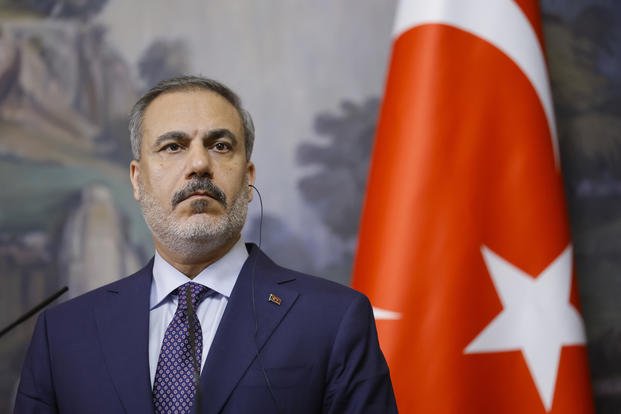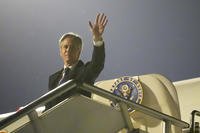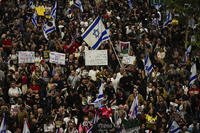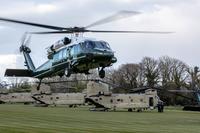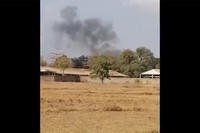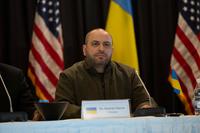ANKARA, Turkey — Turkish warplanes have carried out airstrikes on sites believed to be used by U.S.-backed Kurdish militant groups in northern Syria after the U.S. military shot down an armed Turkish drone that came within 500 meters (yards) of American troops.
A Turkish defense ministry statement said the Turkish jets targeted some 30 sites in the Tal Rifat, Jazeera and Derik regions, destroying caves, bunkers, shelters and warehouses used by Kurdistan Workers’ Party, PKK, or its affiliated Kurdish militia group in Syria, which is known as People’s Defense Units, or YPG.
Turkey has been carrying out strikes on Kurdish militant targets in Iraq and Syria following a suicide attack outside the Interior Ministry building in the Turkish capital earlier this week.
The PKK claimed the attack in which one attacker blew himself up and another would-be bomber was killed in a shootout with police. Two police officers were wounded.
Turkish Foreign Minister Hakan Fidan said the two assailants had arrived from Syria, where they had been trained. He said PKK and YPG positions in Iraq and Syria had now become legitimate targets.
Kurdish authorities in northeast Syria said Thursday evening that Turkish bombing had struck 21 sites and 11 people were killed by the “Turkish aggression” — five civilians and six members of the local government’s Internal Security Forces.
The U.S.-backed and Kurdish-led Syrian Democratic Forces in northeast Syria have denied any relationship to the Ankara attack and accused Turkey of using the attack as a pretext for a new military incursion.
In Washington, the Pentagon said Thursday that the Turkish drone bombed targets near the U.S. troops in Syria, forcing them to go to bunkers for safety. Air Force Brig. Gen. Patrick Ryder, the Pentagon press secretary, said the decision to shoot down the drone of a NATO ally “was made out of due diligence and the inherent right of self-defense to take appropriate action to protect U.S. forces.” There was no indication that Turkey was intentionally targeting U.S. forces, he said.
Turkey's Foreign Ministry on Friday blamed the downing of the drone on conflicting evaluations of what it called a “de-escalation mechanism” operated between the sides. Necessary measures were being taken to ensure a “more effective operation” of the mechanism, the ministry said without elaborating.
“The incident did in no way affect the execution of the ongoing operation and the strikes against targets that were identified,” the ministry said.
Both Defense Secretary Lloyd Austin and the new Joint Chiefs chairman, Gen. CQ Brown, spoke with their Turkish counterparts quickly after the incident to emphasize the value they place on their relationship with Turkey — but also the need to avoid any similar incidents in the future and ensure the safety of U.S. personnel.
The U.S. has about 900 troops in Syria conducting missions to counter Islamic State group militants.
The incident occurred on the same day as a drone attack killed at least 89 people in the Syrian government-controlled city of Homs, where explosive-laden drones were detonated during a military graduation ceremony attended by young officers and their families. An additional 277 people were injured, according to Syria’s health ministry.
Syria’s military blamed insurgents “backed by known international forces,” without naming any particular group, and threatened to respond with “full force.”
The Turkish defense ministry said Thursday’s aerial operation in Syria was aimed at securing Turkey’s borders from threats from the PKK and YPG.
Separately, the ministry said Turkey had retaliated to an attack by militants on a Turkish base in the Dabik region late on Thursday, “neutralizing” 26 militants.
Meanwhile, Anadolu Agency reported Friday that Turkish intelligence agents killed a Kurdish militant in an operation in Iraq’s Sinjar region. The agency identified the militant as Ilyas Biro Eli and said he was responsible for an alleged assassination unit.
The PKK has led a decades-long insurgency in Turkey and is considered a terror organization by Turkey's Western allies, including the United States. Tens of thousands of people have died since the start of the conflict in 1984.
The U.S., however, regards the YPG as a key partner in the fight against the Islamic State group in northern Syria and does not believe the group presents a threat to Turkey.
___
Associated Press writer Abby Sewell in Beirut contributed.
